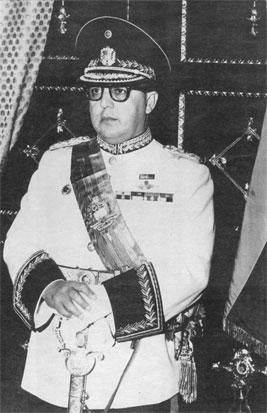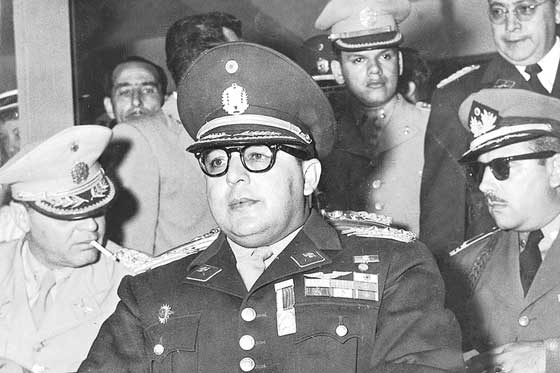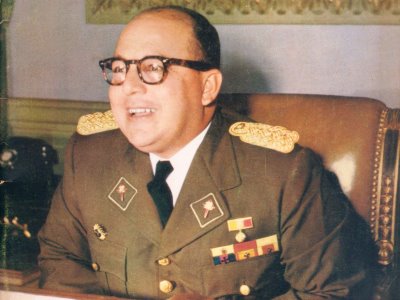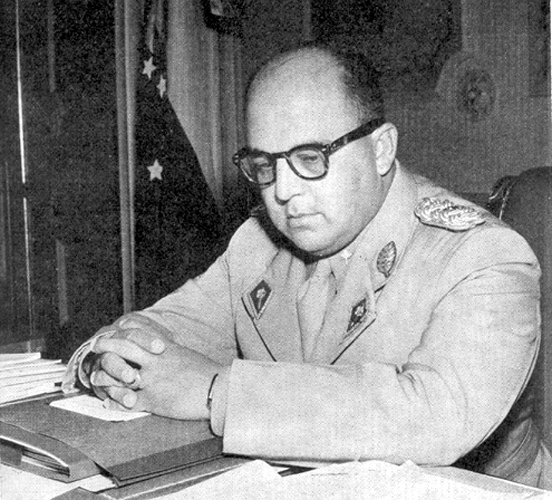<Back to Index>
- Physicist Guglielmo Marconi, 1874
- Writer Sally Alina Ingeborg Salminen, 1906
- Dictator of Venezuela Marcos Evangelista Pérez Jiménez, 1863
PAGE SPONSOR
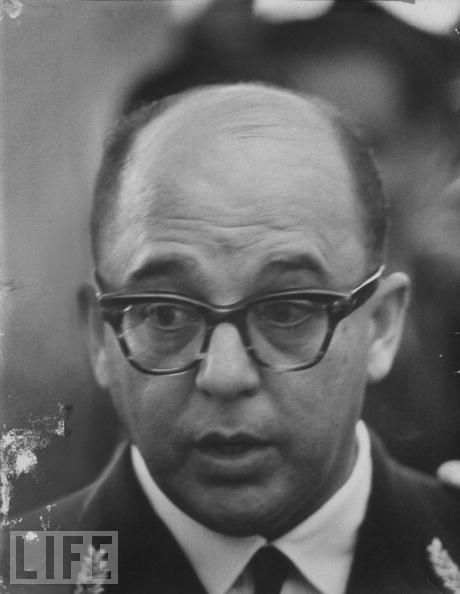
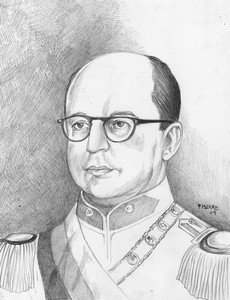

Marcos Evangelista Pérez Jiménez (25 April 1914 – 20 September 2001) was a soldier and President of Venezuela from 1952 to 1958.
Marcos Evangelista Pérez Jiménez was born in Michelena, Táchira State. His father, Juan Pérez Bustamante, was a farmer; his mother, Adela Jiménez, a schoolteacher. Pérez Jiménez attended school in his home town and in Colombia, and in 1934, he graduated from the Academia Militar de Venezuela, at the top of his class. He subsequently studied at military colleges in Peru.
In 1945, Pérez Jiménez participated in a coup that helped install left wing Democratic Action party founder, Rómulo Betancourt, as President of the Revolutionary Government Junta. After a constitutional change providing universal suffrage, elections were held in 1947 which resulted in the election of party member, Romulo Gallegos.
Fears of cuts in pay for military men, reduction and lack of
modernization of army equipment led Pérez Jiménez and Lt.
Colonel Carlos Delgado Chalbaud to stage another coup in 1948, the 1948 Venezuelan coup d'état (Chalbaud
has always been incorrectly referred to by his father's last names.
Carlos Chalbaud's name was Carlos Roman Chalbaud Gomez). Betancourt and
Gallegos were exiled, political parties were suppressed, and the
Communist Party was once again banished by the Military Junta headed by
Delgado Chalbaud, and including Pérez Jiménez. After a
clumsily arranged kidnaping that ended in the murder of Delgado
Chalbaud, the Military Junta changed its name to a Government Junta,
and reorganized itself with Pérez Jiménez pulling the
string of puppet President, Germán Suárez Flamerich.
Results of the much anticipated 1952 elections were showing signs of
rejection of the military government; it is widely believed that the
junta fixed the results to show Pérez Jiménez as the
winner. The junta called
an election for 1952. When early results showed that the opposition
leader was ahead and would win, the junta suspended the election and
made Pérez provisional president on the 2nd of December, 1952. He became president on the 19th of April, 1953. Soon afterward, he enacted a constitution that gave him dictatorial powers. Pérez
Jiménez (widely known as "P.J.") changed the name of the
country, which had been "United States of Venezuela" since 1864, to
"Republic of Venezuela". This name would remain until 1999, when it was
changed to Bolivarian Republic of Venezuela by a Constitutional referendum. (Spanish: República Bolivariana de Venezuela.) During his government, Pérez Jiménez undertook many infrastructure projects, including construction of roads, bridges, government buildings, large public housing complexes and the symbolic Humboldt Hotel overlooking Caracas. The economy of Venezuela developed rapidly during his term. Like most dictators,
Pérez was not tolerant of criticism and his government
ruthlessly pursued and suppressed the opposition. Opponents of his
regime were painted as communists and often treated brutally. While Pérez was president of Venezuela, the government of the United States awarded him the U.S. Legion of Merit. Pérez
Jiménez was up for reelection in 1957, but dispensed with these
formalities. Instead, he held a plebiscite in which voters could only
choose between voting "yes" or "no" to another term for the president.
Predictably, Pérez Jiménez won by a large margin, though
by all accounts the count was blatantly rigged. In
January 1958, there was a general uprising and, with rioting in the
streets, Pérez left the country. He moved to the United States,
where he lived until 1963, when he was extradited to Venezuela on
charges of embezzling $200 million during his presidential tenure. The
1959 - 63 extradition of Perez, related to Financiadora Administradora Inmobiliaria,
S.A., one of the largest development companies in South America, and
other business connections, is considered by academicians to be a
classic study in the precedent for enforcement of administrative
honesty in Latin American countries. Upon
arrival in Venezuela he was imprisoned until his trial, which did not
take place for another five years. Convicted of the charges, his
sentence was commuted as he had already spent more time in jail while
he awaited trial. He was then exiled to Spain. In 1968, he was elected
to the Senate of Venezuela,
but his election was contested, and he was kept from taking office. A
quick law was passed whereby former prisoners were excluded from
participating in the governmental process. Pérez had four daughters with his wife, Flor Chalbaud, and one daughter with Marita Lorenz. He died in Alcobendas, Madrid, Spain, at the age of 87.
